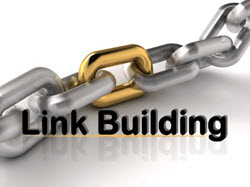Link Building
 Link Building
Link Building
What’s Your Starting Point?
There are many link building tactics. However, link building must be strategic in nature. You must consider the nature of the website being promoted and its starting point. Here are three common starting points. Understanding your starting point (where you are now) will help you determine where you want to go and how to get there.
A Shinny New Website (with no links)
You have just invested in a new website and it has just launched. Owners of a new website would do well to consider how to gain some in-coming links. A new website that quickly gains some in-coming links sends a very nice message to Google and the other big search engines.
However, you need to do it properly. Submitting a new domain name to 500 third-rate directories and social profiles, never to be used again, doesn’t paint a very useful picture for Google and Bing. The engines look for links from relevant content and websites.
If the new website is in a competitive category and up against established websites that already have many proper in-coming links then a link-building program is essential for the new site. It is also important to stress that it is the quality of the links that ultimately wins search position not quantity. Always get links embedded in relevant content.
Note that the more authoritative and relevant the source of the link the better.
An Established Website (with a random link profile)
In contrast with the shinny brand new website, a company that has an established website, who has engaged in media relation activities, advertising, and content creation and content marketing may have a substantial number of links from a wide variety of sources.
However, we see many established businesses with websites where it seems as if no thought has been put into strategic link building. There seems to have been no plan as to the source of the link, the anchor text or even the destination (many links simply go to the home page). The search engine impact of their links is not as beneficial as they could be.
Without proper SEO (Search Engine Optimization) insight and planning inbound links to the company’s website may use random anchor text or use far too many generic linking phrases (visit website, click here or learn more as anchor text). The links may also be mis-matched to destination pages. This results in the presence of the links but not the relevance that the link building can achieve. This type of website has a link profile that is far from optimized and will not have the full link-building effect.
To explain it another way – having 3,000 links to the home page with the anchor text “click here” is not nearly as meaningful as in-coming links to an arborist website with the phrase “stump grinding” and then linking to a page specifically about stump grinding. This link – using the phrase “stump grinding” – and then linking to a page all about stump grinding is useful to human visitors. We all know that the search engines need to please humans. This more specific link is useful to the search engines and when you help them then they help you (hint . . . hint . . . wink . . . wink).
A Website with Many Links (with many questionable links)
The third starting point is the website with many in-coming links – sometimes and unbelievable number of links (given the nature of the website) but upon analysis it is clear that they have purchased links from a dubious source and have ended up with many low-quality and irrelevant links.
These highly suspect links need to be removed before the search engines catch on. If the search engines see large number of dubious links they may take harsh action against the domain and remove it from their search index or perhaps drop it down so far in position that people have great difficulty finding the website in search.
In parallel with the removal process new links should be acquired that are proper. Linking relevant content to relevant content with a keyword phrase that is also relevant will balance out the link profile and help position the site in properly in the search results.
Here is some other useful information from “The Man” himself – Matt Cutts – from Google. This is a summary of an interview with Matt on the topic of link building.
- Link Building Is Not Bad: Just don’t try to get the link first, have compelling content people want to link to instead.
- Press Releases Links: They still “probably not count” but your goal should not be the link but the exposure the press release gives you to editors who may read them and cover your story.
- Content Syndication: If your content is being syndicated on other sites, give Google signals to know you are the original source. Make sure you publish well before others, possibly use rel=canonical, link to main source of content, and maybe use authorship.
- Problem With Guest Posts: A large number of people are doing it the wrong way, guest posts have become more like article directories or article banks these days.
- Links: Links are still “the best way” to rank content.
If you are confused (or don’t know) about the link profile of your website or need some help analyzing or defining a link building plan then fill out the form below. We can help you analyze your current link profile can also help you to build a proper link profile.
